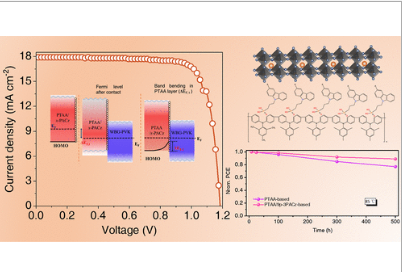Efficiency Enhancement of Wide Bandgap Lead Perovskite Solar Cells with PTAA Surface-Passivated with Monomolecular Layer from the Viewpoint of PTAA Band Bending
Huan Bi, Jiaqi Liu, Raminta Beresneviciute, Daiva Tavgeniene, Zheng Zhang, Liang Wang, Gaurav Kapil, Chao Ding, Shahrir Razey Sahamir, Yoshitaka Sanehira, Ajay Kumar Baranwal, Takeshi Kitamura, Dandan Wang, Yuyao Wei, Yongge Yang, Dong-Won Kang, Saulius Grigalevicius, Qing Shen, and Shuzi Hayase
ACS Applied Materials & Interfaces 2023 15 (35), 41549-41559
https://doi.org/10.1021/acsami.3c08655
This research focuses on enhancing the efficiency of wide bandgap lead halide perovskite solar cells (WBG Pb-PVK PSCs) using FA0.8Cs0.2PbI1.8Br1.2 as the light-harvesting layer. By passivating the hydrophobic surface of the hole transporting layer (PTAA) with a monomolecular layer, improved hydrophilicity and band alignment result in WBG Pb-PVK PSCs achieving an impressive 16.52% efficiency at 1.77 eV.
How Paios was used
MS curves, EIS, TPC, and TPV results were all performed using Paios from Fluxim

